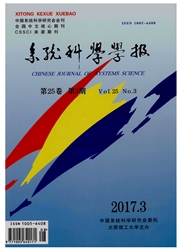

 中文摘要:
中文摘要:
现代科学中基于原子论的力学规律被认为是极其成功的自然法则,解释了世界为什么是这个样子。但现代科学中的二元论造成了主体与客体的分离,形成了人与自然对立的世界观,在哪怕一点点偏离简单机械物理系统的情形时就顿时失去了效用,这严重阻碍了其成功走向生物、人文、社会等领域,有失其作为宇宙第一法则的地位。本文首先分析了力学法则引起的对自然不可逆现象和熵的主客观之争。提出了一个新的生成性的实在,这样非局域性、不可积、不可逆、熵和信息特征自然地一开始就出现在微观动力学中,而可逆微观动力学仅是简化的特例,熵原理可取代基于原子论的力学规律作为宇宙的第一法则。不可逆性(熵)具有主观性和客观性这两种观点可以统一起来。被认为是认识论"幻象"和"主观性"的宏观不可逆世界也具有本体论的地位。以熵原理为宇宙的第一法则的科学可形成主客体统一的自洽世界观,构建起一个统一两个世界、两种文化的新框架。
 英文摘要:
英文摘要:
Mechanistic principles basing on atomism in modern sciences have been taken as perfect laws for explaining how our world organizes. Nevertheless, dualism of departing object and subject in modern sciences are seriously aliening human and nature. Disabilities of mechanistic principles in even a little away from simple mechanistic physical systems have hindered their successful extensions to biological, cultural and social fields, largely being challenged as the first laws in nature. By analyzing the discrepancies between subjective and objective opinions on irreversible phenomena and entropy, a generative reality is accordingly proposed in the paper, where non-locality, non-integrability, irreversibility, entropy and information occur naturally in microscopic dynamics, with reversible microscopic dynamics as a simplified case. Entropy principle instead of mechanistic principles is proposed as the first laws in nature. Subjective and objective opinions on irreversible phenomena and entropy can be partially unified. Macroscopic irreversible nature once taken as hallucination or subjective in epistemology has positions in otology. New sciences with entropy principle as the first laws in nature have formulated a uniform world ideology that unifying subject and object, providing a unified framework to deal with two worlds and two cultures.
 同期刊论文项目
同期刊论文项目
 同项目期刊论文
同项目期刊论文
 期刊信息
期刊信息
